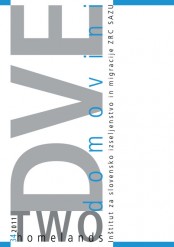Complex and Multi-layered Processes of Decision Making on Length of Stay: European Citizens from A8 and A2 Countries in the UK1
Keywords:
A8/A2 migration, decision making, length of stay, bounded rationalityAbstract
This article focuses on post-2004 migration to the UK from A8 and A2 countries and discusses the complex, multi-layered and bounded nature of migrants’ decision making on length of stay. It argues that the maximisation of economic benefits is only one factor amongst many which influences decision making. Following a ‘bounded rationality’ approach the article considers the following three dimensions of decision making: perception of environment, goals and normative principles. Data from a longitudinal study of migrant workers in the East of England will be used to illustrate migrants’ decisions on length of stay. The study combined a mixed methods approach with a longitudinal panel approach and the article will present findings from three phases of semi-structured interviews (a core group of 30 A8/ A2 citizens over three years) and two surveys (161 participants in year 1 of which 61 responded in year 2). The article concludes that the maximisation of economic benefits is only part of a complex bundle of factors which influence decisions on length of stay. A positive perception of the wider social situation in the UK (influenced partly by participants’ transnational experience), a strong goal orientation (in the context of personal life and education) and strong normative principles (reflected in aspirations, de- termination, resilience and a certain flexibility regarding notions of identity and belonging) have been highlighted as important factors in decision making processes on length of stay.
Downloads
References
Al-Ali, Nadje and Khalid Koser (eds.) (2002). New Approaches to Migration? Transnational Communities and the Transformation of Home. London: Routledge.
Baker, Nicola (ed.) (1996). Building a Relational Society. Aldershot: Arena.
Cassarino, Jean–Pierre (2004). Theorising Return Migration: a Revisited Conceptual Approach to Return Migrants. EUI Working papers.
Chappell, Roma (2009). Migration Statistics Improvement Programme. UK Statistics Authority Meeting: Review of Migration Statistics – a discussion of the interim report. London: Royal Statistical Society available at: www.statisticsauthority.gov.uk/news/index.html.
Constant, Amelie and Douglas Massey (2002). Return Migration by German Guestworkers: Neo-classical versus New Economic Theories. International Migration 40: 4-38.
Constant, Amelie and Douglas Massey (2003). Self-Selection, Earnings and Out-Migration: A Longitudinal Study of Immigrants to Germany. Journal of Population Economics 16: 631-653.
Constant, Amelie and Klaus Zimmermann (2009). Migration, Ethnicity and Economic Integration. Institute for the Study of Labor: Discussion Paper No. 4620.
Dustmann, Christian (2001). Why Go back? Return Motives of Migrant Workers. International Migration: Trends, Policy and Economic Impact (ed. Slobodan Djajic). London: Routledge.
Eade, John, Stephen Drinkwater and Michal Garapich (2006). Class and Ethnicity: Polish Migrants in London (ESRC Research Report). University of Surrey. Centre for Research on Nationalism, Ethnicity and Multiculturalism.
Holman, Deborah and Claudia Schneider, with Roxana Anghel and Alex Collis (2008). Economic Migration in the East of England (Update 2007) - Meeting the Information Needs of Economic Migrants (MINEM) available at www.minem.eu.
Schneider, Claudia (2006). Analysing Immigration Control Policy – A Case Study Regarding the Amendment of Art. 16 (2) of the German Constitution. London School of Economics (PhD, unpublished).
Schneider, Claudia and Deborah Holman (2009). Longitudinal Study of Migrant Workers in the East of England. First Interim Report. East of England Development Agency, European Social Fund.
Schneider, Claudia and Deborah Holman (2010). Longitudinal Study of Migrant Workers in the East of England. Second Interim Report. East of England Development Agency, European Social Fund.
Schneider, Claudia and Deborah Holman (2011). Longitudinal Study of Migrant Workers in the East of England. Final Report. East of England Development Agency, European Social Fund.
Sen, Amartya (1982). Choice, Welfare and Measurement. Oxford: Blackwell.
Simon, Herbert (1985). Human Nature in Politics: The Dialogue of Psychology with Political Science. The American Political Science Review 79(2): 293-304.
Spencer, Sarah, Martin Ruhs, Bridget Anderson and Ben Rogaly (2007). Migrants’ Lives Beyond the Workplace: The Experiences of Central and Eastern Europeans in the UK. York: JRF.
Thomson, Rachel and Janet Holland (2003). Hindsight, Foresight and Insight: The Challenges of Longitudinal Qualitative Research. International Journal of Social Research Methodology 6(3): 233-44.
Vertovec, Steven (1999). Conceiving and Researching Transnationalism. Ethnic and Racial Studies 22(2): 447-462.
Downloads
Published
How to Cite
Issue
Section
License

This work is licensed under a Creative Commons Attribution-NonCommercial-NoDerivatives 4.0 International License.
Authors guarantee that the work is their own original creation and does not infringe any statutory or common-law copyright or any proprietary right of any third party. In case of claims by third parties, authors commit their self to defend the interests of the publisher, and shall cover any potential costs.
More in: Submission chapter





